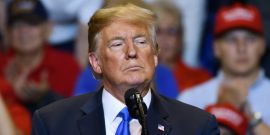It’s easy to imagine suburbanites, even large numbers of women, preferring the Trump they know to the socialist they don’t.
Political Correctness Promotes Political Violence
The recent violence at Trump rallies has been the work of protesters, not of his supporters. I am no fan of Trump, but he has as much right to speak without disruption as any citizen. Indeed, it is even more important to afford him that right than ordinary citizens, because he is the presumptive nominee of one of our two major parties. Violence distracts from the debating his ideas, such as they are, and will create greater political polarization at the expense of deliberation.
Sadly, there is a connection between this violence and the enforcement of political correctness in our educational institutions today. The disruptive protesters at Trump rallies are almost all young—recent products of our educational system. They are thus steeped in the unreformed religion that dominates our schools—one where error has no rights.
Indeed, when Trump 2016 was chalked on the sidewalk of Emory University, the administration began an investigation into who wrote it. More generally, college administrators have permitted events to be cancelled because of the threat of disorder without speaking out against such cancellations. As my friend Mike Rappaport noted, those in leadership positions at universities fail to defend the idea of the university when they do not actively protect the norms of liberal discourse on campus. But their failure has social consequences beyond the ivory tower and we are seeing them now.
The difference between a democratic sensibility and an authoritarian one is precisely the acknowledgement that error has rights—a key premise of classical liberalism. Protecting the right to put forward ideas we believe erroneous also defends a liberal democracy. That ideal of this kind of democracy ultimately depends on a system of trial and error, where we experiment with different policies, discard those that fail, and keep those that work.
This understanding of liberal democracy shows the deep connection between the rise of science and the rise of democracy—both are empirical projects. And it is why that best liberal democracies incorporate a large element of decentralization, such as a system of federalism with national exit and speech rights. That structure maximizes the opportunity for democratic experimentation and minimizes the costs of mistakes.
Higher education has historically been the engine for creating and perfecting the democratic and scientific society by graduating a cohort of ever more intellectually curious and tolerant people. But today our universities in particular are failing in their mission. Their decline is more dangerous than Trump’s rise and much harder to correct.

